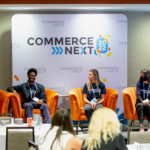It’s no secret that marketers are looking for ways to better connect with Gen Z consumers. At this year’s CommerceNext ecommerce summit, Winnie Park, CEO of Forever 21, hosted a notable session on how the brand has innovated to stay culturally fluent and deeply connected to its customers. At the heart of her strategy is a focus on meeting Gen Z where they are, engaging with them and simply co-existing.
The key takeaways from this session include:
- Gen Z prefers authenticity over corporate marketing/partnerships.
- To create a relationship with Gen Z, you can’t do everything for-profit.
- The importance of integrating into the Gen Z cultural zeitgeist moments of fashion, culture, music and art.
- How to embrace “what’s next”.
Watch the full session recording below or continue reading for a more in-depth exploration of the session’s takeaways.
1. Gen Z Prefers Authenticity
When Winnie started at Forever 21, she focused on studying the Gen Zers around her and discovering how the brand could become relevant for them. She quickly realized that they have a unique ability to see through corporate marketing/partnerships and prefer that a brand engages with them authentically.
Forever 21 has focused on improving its authenticity through TikTok, a platform that has become the primary channel for news, information, food and more. They find that their best content is created by their associates sharing in-store experiences and from the network of people who are passionate about Forever 21. This type of content bodes well for a generation that values real opinions and perspectives.
2. Meet Consumers Where They Are
When marketing to Gen Z, Winnie recognizes the importance of doing more than just slapping the brand logo onto something. She explains how to create a relationship with Gen Z consumers, you can’t do everything for-profit.
Forever 21 recently dropped their 4th collaboration with Barbie, just ahead of the movie premiering across the world. The collection features 76 pieces and is their biggest collaboration with the brand so far. With the current rise in popularity of wearing pink attire to watch the Barbie movie, this partnership offers the ideal outfit for the occasion. Forever 21 also partnered with Roblox and Shopcity to simultaneously bring the brand and the special Barbie pieces to the metaverse so that users can twin with their avatars, try on different outfits and shop the digital collection. As a non-commercial venture, this is a way that Forever 21 can just coexist with Gen Z and elevate their experience on platforms that they are already using.
3. Integrate into the Gen Z Cultural Zeitgeist
Forever 21 is focused on placing the brand at the center of the relevant Gen Z cultural zeitgeist moments of fashion, culture, music and art. Festivals have become a large part of how Gen Z consumes music and culture through the different outfits, atmospheres and overall ability to self-express. 70 million tickets were sold for concerts in 2022, proving how music paired with the opportunity for self-expression is quickly becoming a cultural phenomenon.
Forever 21 has recognized this and launched a collaboration with Rolling Loud, the largest hip-hop festival in the world. The collection takes inspiration from Miami’s nightlife and different ‘90s styles, giving people the chance to express themselves in clothes that they might not wear every day. At the festival, Forever 21 has a booth on the grounds offering beauty touch-ups, hair extensions and more. Their focus on meeting Gen Z where they are and helping them explore their individuality in the festival setting sets them apart from other brands.
4. Embrace “What’s Next”
As Forever 21 continues to grow and expand, they remain focused on prioritizing Gen Z. One of its main goals for the future is to move from being pure fast fashion to really becoming a resource and ally for those who want to self-express through fashion. They are focusing on being more conscious about what products they put out and are actually now making 30% less overall product in an effort to reduce over-consumption. Prioritizing quality over quantity, they emphasize designs and a focus on participating in various cultural occasions.
Gen Z doesn’t follow trends that are dictated to them in the same way that generations in the past have. They plan to use fashion for self-expression, a goal that Forever 21 aims to help them achieve.
For more on how to market to Gen Z check out our blog with tips from E.L.F. Beauty, COACH and more from Forever 21!
FAQs:
1. In what ways can retail brands authentically engage with Gen Z consumers across various digital platforms beyond traditional advertising and partnerships?
Retail brands can authentically engage with Gen Z by leveraging UGC, fostering genuine interactions and showcasing real experiences rather than polished advertisements. For example, brands can encourage customers to share their experiences with products or create content related to their interests, creating a sense of community and authenticity around the brand.
2. How can retail brands effectively integrate themselves into the cultural zeitgeist of Gen Z while maintaining authenticity and relevance?
Retail brands must stay up-to-date with current trends, understand the values and interests of the demographic and align their brand messaging and products accordingly. Whether it’s by participating in relevant events, collaborating with influencers who resonate with Gen Z or incorporating cultural references into marketing campaigns in a meaningful and authentic way, try to truly understand Gen Z and meet these consumers where they are at.
3. What strategies can retail brands employ to adapt their marketing approaches to meet the preferences of Gen Z consumers, who prioritize authenticity and meaningful engagement?
Retail brands can adapt their marketing approaches to meet the preferences of Gen Z consumers by prioritizing authenticity, transparency and purpose-driven messaging. This may involve focusing on sustainability, social responsibility and inclusivity in brand messaging and product offerings, as well as utilizing platforms like TikTok and Instagram to engage with Gen Z in creative and meaningful ways. Additionally, brands can leverage data-driven insights to personalize marketing efforts and tailor messaging to resonate with the preferences and values of Gen Z.
Related Posts
-
How to Successfully Market to Gen Z: Insights from Forever 21, e.l.f. Beauty and Coach
Gen Z is the first generation to grow up entirely…
-
What Gen Z Consumers Are Looking For
Gen Z consumers are a hot topic in retail right…
-
How E.L.F. Cosmetics Captured the Gen Z Target Market
Breaking Down the E.L.F. Cosmetics Target Market In response to…




